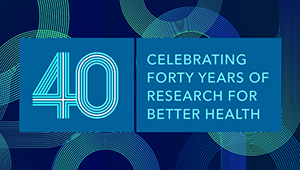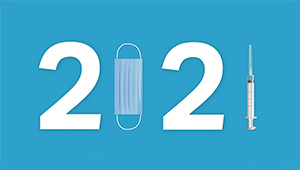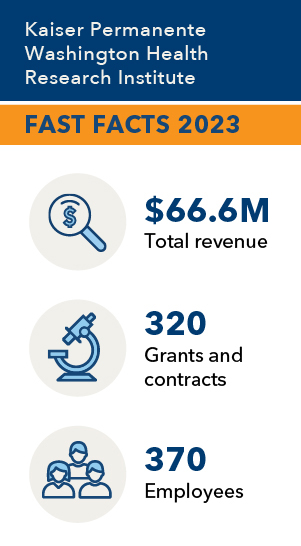History
Video produced by Melissa Parson
At Kaiser Permanente Washington Health Research Institute (KPWHRI), we conduct practical research for better health — and we have done so for over 40 years. From testing new vaccines to helping people quit smoking to finding ways to delay or prevent Alzheimer’s disease, our discoveries have helped millions of people worldwide lead healthier, happier lives.
Here’s a brief look at our first 4 decades, starting in the early 1980s when we were part of Group Health Cooperative. For more highlights, please visit our 40th anniversary timeline.
Center for Health Studies established
In 1983, the Group Health Board of Trustees established the Center for Health Studies (CHS). With Ed Wagner, MD, MPH, at the helm, the center's research helped Group Health become a national leader in such areas as breast cancer screening, immunization, smoking cessation, health promotion in older adults, and epidemiology and management of common chronic diseases. Focusing on evidence-based medicine and improved clinical outcomes, Group Health and CHS emerged as key players in transforming the U.S. health care system and helping shape global research priorities, clinical guidelines, and coverage standards.
Leading with a spirit of collaboration
CHS continued to expand its research capabilities over the next decade, with grant revenue topping more than $5 million by 1993. Through collaboration with researchers locally, nationally, and internationally, CHS added breadth and depth to its findings, using multi-disciplinary approaches to study larger populations. Among our key partners — then and now — are the Fred Hutchinson Cancer Center, Veterans Affairs Puget Sound Health Care System, and several major universities, including the University of Washington (UW) and the University of Michigan.
CHS also provided collaborative leadership through its MacColl Institute for Health Care Innovation, founded in 1992. MacColl Center staff worked with Group Health to create and pioneer the Chronic Care Model, with funds for development and dissemination coming from the Robert Wood Johnson Foundation. The model is now used by thousands of health systems worldwide to guide efforts to improve care for chronic conditions.
In 1994, CHS launched the Adult Changes in Thought (ACT) Study, in partnership with UW researchers and the National Institute on Aging. This landmark study of older adults — which continues today — seeks to better understand factors that affect healthy aging and cognition.
In 1996, CHS leaders catalyzed the formation of the Health Care Systems Research Network (HCSRN), a 20-member consortium of health plans within integrated health care systems. Through the HCSRN, our researchers work with thousands of scientists nationwide to combine and study data from a diverse population of millions of people.
By the decade's end, Wagner had stepped down from leading CHS to focus on directing MacColl. Sue Curry, PhD, became the center's next director as annual grant revenue exceeded $10 million. CHS welcomed a new director in 2002: Eric B. Larson, MD, MPH, previously the medical director of the UW Medical Center.
In 2007, the Center for Community Health and Evaluation joined CHS, bringing an expanded focus on designing and evaluating programs and initiatives to improve community health.
CHS becomes Group Health Research Institute
CHS changed its name to Group Health Research Institute (GHRI) in September 2009, a move intended to boost the organization’s visibility locally and nationally — and to further solidify Group Health's role as a leader in transforming health care.
Over the next decade, the institute continued to grow in size and influence — despite an uncertain climate for federally funded research. In addition to traditional and new lines of research, it focused on further developing the larger organization’s capacity as "a learning health care system" — a place where research influences practice and practice influences research.
Research on Group Health innovations — such as shared decision-making for preference-sensitive conditions and an opioid risk-mitigation initiative — are examples of successful collaborations between the organization’s clinical leaders and scientists in developing our learning health care system. Others include ongoing efforts to develop more patient-centered models of primary and specialty care and to continually improve strategies for cancer screening.
In 2017, we became Kaiser Permanente Washington Health Research Institute
Group Health signed an acquisition agreement with Kaiser Permanente in 2016 and began work to become the eighth region of this large, not-for-profit health plan. With this change, our institute prepared to become part of Kaiser Permanente’s research network. In February 2017, we became Kaiser Permanente Washington Health Research Institute.
The transition gave us new opportunities to contribute to the larger organization's operating plan, including the launch of our Learning Health System Program, which the region funds to advance the use of research capabilities to continually provide better care for Kaiser Permanente members. Four years later, the Learning Health System Program and the MacColl Center joined to form KPWHRI’s Center for Accelerating Care Transformation (ACT Center).
The next several years also brought an influx of new scientific investigators, including those with special interests in research on social determinants of health and implementation science. Meanwhile, we continued to focus on improving care for health problems affecting millions — issues such as addiction, cancer, infectious disease, and chronic conditions like heart disease, depression, Alzheimer's disease, and more.
In August 2018, following Larson's decision to step away from his leadership role to concentrate on his own research projects, the institute began a nationwide search for his successor. On June 6, 2019, Rita Mangione-Smith, MD, MPH, was named as Kaiser Permanente Washington's new vice president for research and innovation and KPWHRI's executive director. Mangione-Smith is a pediatrician/scientist with extensive expertise in quality improvement and health systems from her leadership posts at Seattle Children's and the UW School of Medicine.
At the forefront of COVID-19 research
2020 was the year that COVID-19 took the world by storm. KPWHRI was at the forefront of testing vaccines to ward off the disease — most notably leading the first-ever clinical trial for a COVID-19 vaccine. The institute also helped to pioneer surveillance models to analyze and track how the coronavirus spread. And we worked with colleagues in the Kaiser Permanente Washington health organization to devise innovations that let patients access needed health care while limiting exposure to the virus.
KPWHRI continues to help lead efforts to test the safety and efficacy of COVID-19 vaccines, as well as vaccines for other viruses, including schistosomiasis and mpox.
Working toward an equitable future
The early 2020s have been a time of unprecedented social change. KPWHRI continues to pursue research that addresses health inequities and seeks ways to reduce disparities in care. Among other research, a 2021 KPWHRI-led study took a close look at prediction models that use health record data to identify people at high risk of suicide, finding that models that work well in a general population sample can perform poorly in some racial and ethnic groups. And a 2022 study gave valuable insight into factors contributing to racial and ethnic disparities in COVID-19 outcomes.
40 years on — and going strong
In October 2023, KPWHRI marked its 40th year as a research institute, with grant revenue exceeding $66 million. We are extremely proud of our history and excited about our vision for the future: partnering with researchers, health systems, and communities to improve health care, eliminate inequities, and help people thrive where they live, learn, work, and play.
KPWHRI timeline

Our first 4 decades: 1983 to 2023
Read about our history and the impact of our research in our 40th anniversary timeline.
2023 in review

Top research highlights in 2023
From pain management to cervical cancer screening, these are the research stories that made headlines over the last year.
2022 in review

Top research highlights in 2022
From cardiovascular health to cancer screening, these are the research stories that made headlines over the last year.
2021 highlights

Top 10 research highlights in 2021
We look back at 2021 research findings, including on COVID-19 vaccines, health equity, dementia, and suicide risk factors.
2020 highlights

10 ways we helped chart a safer passage in 2020
KPWHRI responded to the COVID-19 hurricane with actions to improve health worldwide.



